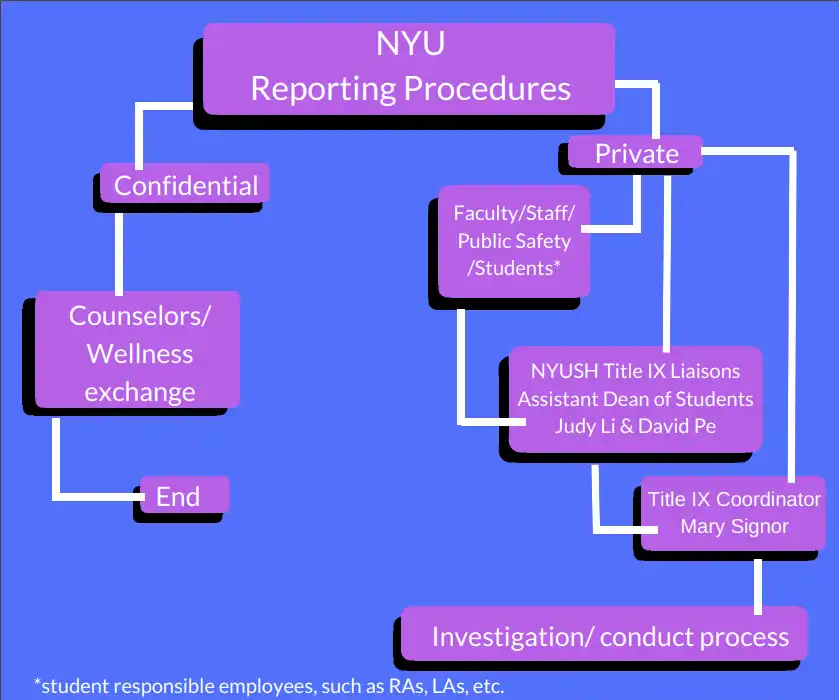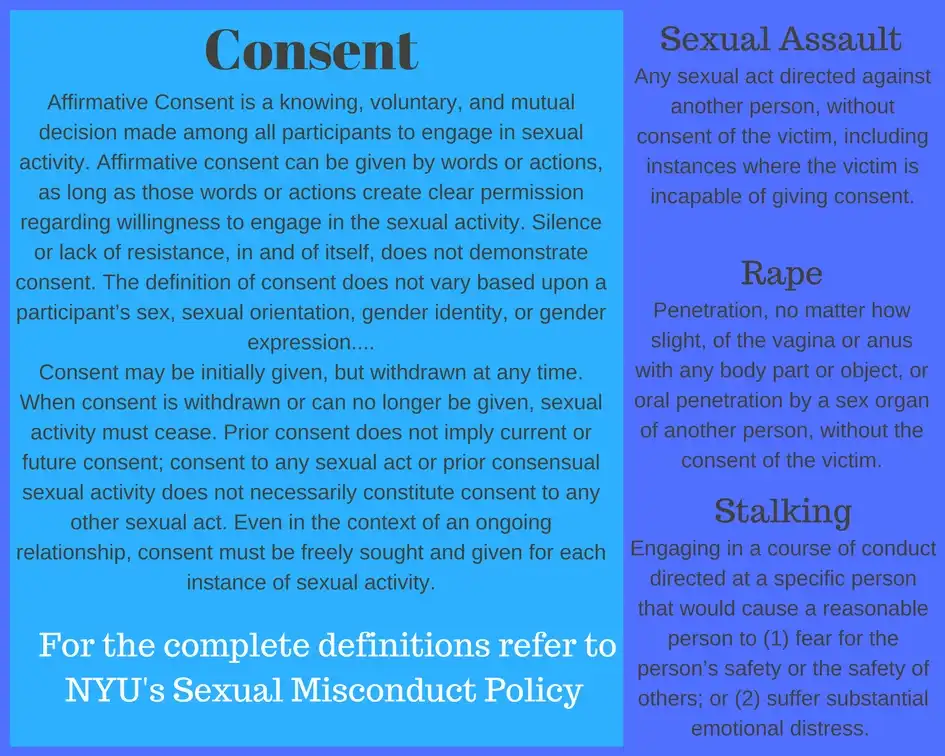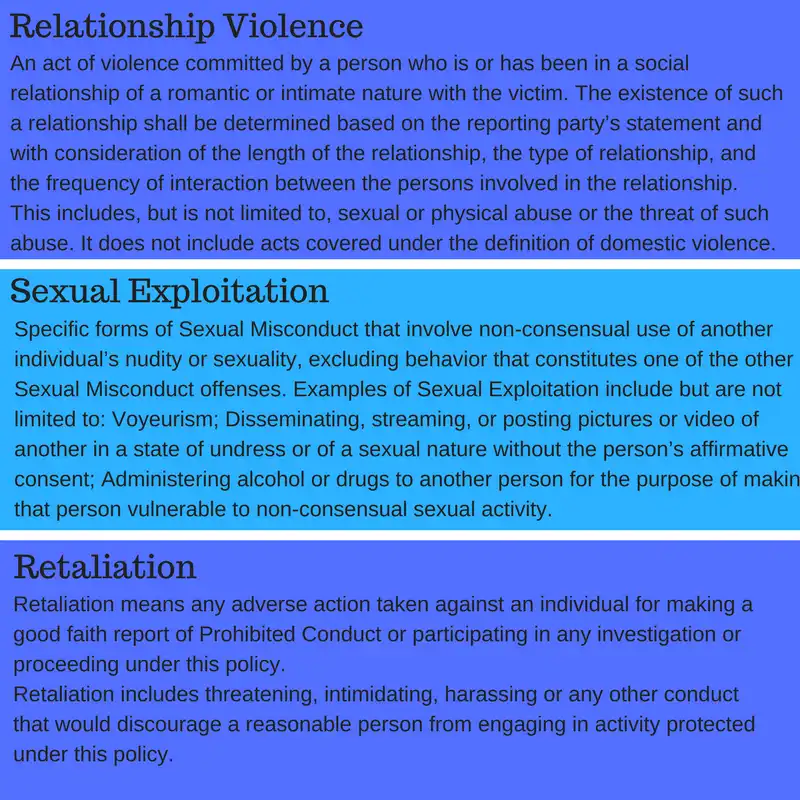Ally Week Brings Sexual Assault to the Fore
Please see the end of the article for a list of confidential and private resources available to students and employees and links to NYU Policies. NYU Shanghai’s Ally Week this fall was the first year to include events regarding the topic of sexual misconduct. On Nov. 6, Ally Week Committee members handed out pamphlets on B1 regarding NYU’s Sexual Misconduct, Relationship Violence, and Stalking Policy to advertise a discussion held the next day titled “More Than Just Hashtags: On Sexism & Sexual Harassment.” “I think the main purpose for the sexual misconduct policy is to ensure people involved in this kind of incident get enough support,” said Assistant Dean of Students & Title IX Liaison Judy Li. Freshman orientations this year and last year included interactive sessions discussing and clarifying the policy, in addition to a required online course that students must complete before arriving on campus. Those are the main ways that NYU Shanghai Title IX Liaisons, Li along with Associate Dean of Students David Pe, advertise reporting procedures and the policy on campus. There are different avenues through which NYU provides this support to students. The only support system that can keep confidentiality is a Health & Wellness counselor. Confidentiality means “information will not be shared with anyone else without your permission, subject to certain exceptions provided by the law,” according to NYU Policy. “It’s a confidential resource and so we don’t know what conversation has happened and what they’ve decided,” Pe said. “Whatever the counseling is, it’s protected between the counselor and the client and so we wouldn’t be privy to any of that information.” The only situation in which a counselor would be legally obligated to break confidentiality is “if there’s a risk of serious harm,” explained Head of Health and Wellness and Dean of Students Charlene Visconti. Visconti also added that this has yet to happen at NYU Shanghai. The other avenues of reporting an incident are not confidential, but are instead referred to as 'private.' Privacy is defined in the policy as meaning “information related to a report of misconduct will be shared only with a limited circle of individuals who ‘need to know’ in order to assist in the investigation, resolution and related issues.” These channels focus on getting the information to NYU Title IX Coordinator Mary Signor. The Title IX office in New York under Signor handles all sanctions and student conduct hearings. “It’s centralized for the point of managing consistency so that there’s a single office at the university that hears the cases for any NYU student,” Pe explained. “It’s not then that Shanghai is trying to manage this case in the context of their situation and may not be able to understand what the larger philosophical approach and what the practice is. That’s why they have investigators and other people centralized to handle any case that happens across any NYU academic center – Abu Dhabi, Shanghai and New York.” Students can directly contact Signor via email or phone (please see the end of the article for a full list of resources). Pe or Li are also available for students to make reports to and can assist the student in reporting the information to Signor. “We are here to provide an in-person direct contact,” Pe said, noting that oftentimes meetings with Signor may occur via a computer. “If someone is upset or someone wants to talk to somebody and they’re like I don’t want to be facing a computer, our role is to take that information and pass it along. After that information is passed along, we’re out of the picture unless [Signor] and the Title IX office feels that there’s information that needs to be managed by us for us to go coordinate,” Pe explained. As coordinators, Pe or Li would, if the situation necessitated it, handle accommodations with Academic Affairs such as switching classes or moving dorm rooms through Residential Life. On some occasions, NYU may issue a solution without the student’s request. “The response is if you’re both NYU Shanghai students or NYU students, we have an obligation and responsibility to make sure the learning environment of you and others are not impacted by and this is why we are going to intervene,” Pe explained. The third channel through which incidents get reported is when a student informs an NYU Shanghai employee, including faculty members, staff, Public Safety, and student workers with any level of responsibility (Learning Assistants or Resident Assistants, for example). “Oftentimes there’s always a case where someone says hey, I need to tell you something, but can you please keep it confidential,” Pe said. “And the important thing is that anybody who has received the proper training would know the response would be unfortunately I can’t keep anything confidential, if you want to keep something confidential, you can go to talk to a counselor. I can keep it private, but I may need to share this information with individuals that need to know.” The employee is required to consult with Pe, who then coordinates with Signor’s office in New York and the employee is never consulted again by Pe or Li. The same goes for Pe and Li’s roles. “I know some cases we don’t know the sanction at the end either because we were not notified by Mary’s team,” Li said.

The different ways in which the report can be resolved are varied and handled by Signor’s office on an individualized basis. “It’s all case-by-case again and dependent on the context of the situation and what is necessary to ensure that the individual feels that there are measures in place that will give them a sense of security and comfort in the process,” Pe said. Student’s opinions and desired outcomes are heavily emphasized. “Based on my past three years’ working experience on this area, I feel students’ feelings are really respected in the whole process and students can definitely stop in the middle,” Li said. “It’s not saying like once I report, it’s mandatory to move forward, students’ feelings will always be respected.” All of the previously mentioned aspects of reporting and student conduct processes are solely NYU community policies and procedures, but students can still get help from Signor’s office to file a report outside of the community, if they wish to. At NYU Shanghai with varying nationalities and cultures, reporting an incident through the criminal justice system may seem daunting. “We would sit down with them to walk them through to explain the differences and ensure that they have informed information before going through that route,” Pe said, explaining that the two processes are completely separate. “There’s the two processes and sometimes that might end up happening before an NYU process as well, in which case we would still then adhere to the NYU process in terms of supporting the individual, because of the context that they’re here and then also helping them navigate.”

The other complication is defining the different policy violations and ensuring that all community members from all different backgrounds understand the terminology and context. Confusion can arise from different legal definitions and processes in various countries. For example, Chinese law does not recognize rape against men and does not have a definition for dating violence, stalking, or consent. David Pe explained that two instances of prohibited conduct that are commonly misunderstood are retaliation and sexual exploitation. The retaliation policy exists to ensure that complainants do not need to fear any adverse consequences that may result from submitting a report. “The whole idea is that a report was submitted, if the respondent is notified that this is an investigation that’s taking place, they need to understand that they need to wait until the process is complete and that they cannot retaliate against the individual who did that,” Pe commented. “I think that’s a better way to have people realize that you know there’s a process in which that would go about that may have an outcome and until you get to that point, there should be a very clear distance and a very clear line that you create during that period of time. It’s there to protect both parties.” Sexual exploitation is another area that confusion commonly arises in. It is defined in NYU’s Sexual Misconduct Policy as “specific forms of Sexual Misconduct that involve non-consensual use of another individual’s nudity or sexuality,” except for those areas that may fall under a different violation. Examples of this prohibited conduct include “taking pictures, videos, or audio recordings of another person engaging in a sexual act, in a state of undress, or in a place and time where such a person has a reasonable expectation of privacy,” without consent; “disseminating, streaming, or posting pictures or video of another in a state of undress or of a sexual nature without the person’s affirmative consent”; and “administering alcohol or drugs to another person for the purpose of making that person vulnerable to non-consensual sexual activity.” Dean Pe explained that the sexual exploitation policy can be particularly confusing, given the internet and social media culture today. “People have to realize that that’s considered a policy. I think oftentimes there’s so much emphasis on the policy on assault and a piece that people feel that the other things are not important and everyone should know that all of these things are equally weighed in that whole entire process,” Pe said. “That’s important for people to realize that there’s not one of these prohibited conduct that outweighs another conduct.”

All of these definitions are specific and extensive in order to ensure that the respondent may not use the excuse of misunderstanding or cultural differences. “The reason why the policy exists and is so clearly defined in terms of sexual harassment, sexual assault, sexual exploitation, domestic violence, [dating] violence, stalking and all those things is to ensure that no one says in my culture, you know, stalking is considered acceptable. We’ve taken all of that aspect to create the NYU culture around this topic,” Pe said. The sessions during freshman orientation and events during Ally Week are results of this move to create that culture. Yet, the classes of 2018 and 2019 did not receive any in-person training on this topic. This was due to a delay while NYU Shanghai Student Life coordinated their message with NYU New York. As classes went to study away, it became more complicated to get the message across. “The problem is that we’ve been having a hard time sustaining a community culture to pass information and try to continue the work and so I think we need to think about how to do that,” Pe explained, emphasizing that they need student participation. “One of the things is we rely heavily on students to be part of the action and so for three years we’ve tried to create an ad-hoc committee in Health and Wellness to do promotions and address some of these issues and it keeps flopping. And so if there’s a student that would like to take this on and kind of create something, we’re more than happy to provide a place for them to do that.” However, Pe emphasized that the key to this is bringing in all members of the community. “At the same time if we truly want to get work done we would want to bring multiple perspectives in the room at the table,” he said, explaining that they’re focused on promoting the NYU definition rather than any specific country’s interpretation. “We eventually want to create a website specifically for NYU Shanghai as well, that would have resources that can help people that again is a context here, potentially in different languages and that encompasses potential technical terminology that might be harder for people to grasp immediately,” Pe added. “So you know there’s a lot of ideas we just need people now.” Confidential resources available to students include NYUSH Health and Wellness Counseling Services (Academic Building Room 605; +86 021 2059 9999; shanghai.health@nyu.edu).Private resources available are NYU's Title IX Coordinator Mary Signor (726 Broadway 721, New York, NY; +1 212 998 2352; mary.signor@nyu.edu); NYU's Title IX Liaisons Judy Li (Room 108; hl50@nyu.edu) or David Pe (Room 1433; davidpe@nyu.edu); NYU Shanghai Public Safety (Room 118; +86 21 2059 5500).NYU's Sexual Misconduct, Relationship Violence, and Stalking Policy; Resource Guide for Students; Resource Guide for Employees; Procedures for Complaints against Students; and Procedures for Complaints against Employees can be found here.NYU Shanghai's 2017 Public Safety Report can be found here. This article was written by Allison Chesky. Please send an email to managing@oncenturyavenue.com to get in touch. Photo Credit: Pixabay